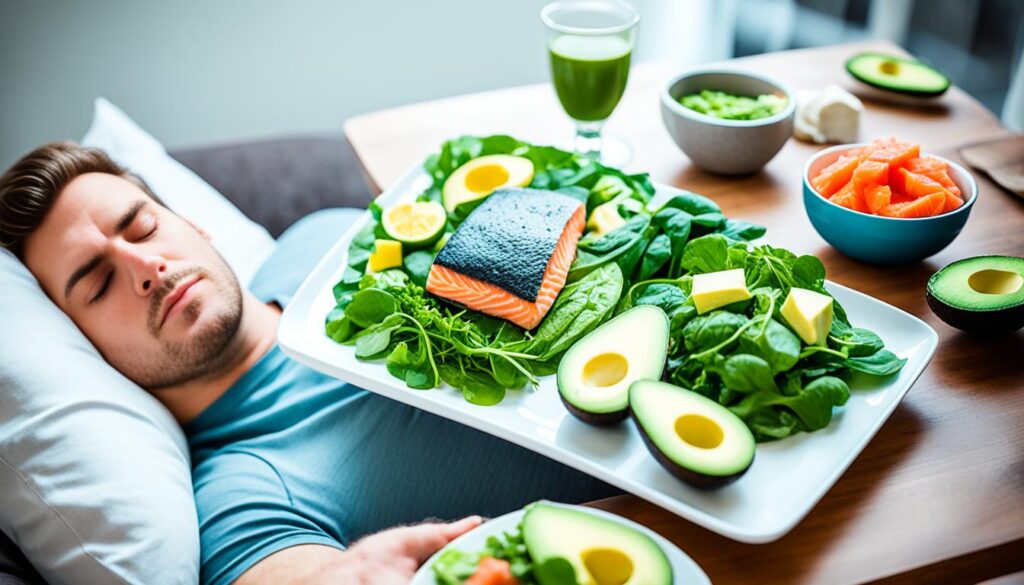Narcolepsy is a tough neurological disorder that causes too much daytime sleepiness and other issues. Some health experts think the Keto Diet could help people with narcolepsy. This low-carb diet focuses on eating a lot of fat, which might change how sleep disorders are handled.
This article looks into how the Keto Diet might help with narcolepsy. We’ll look at the science and what people say about it. We want to see if eating in a ketogenic way could ease symptoms for those with narcolepsy and other sleep problems. For more info on narcolepsy, check out this link.
Key Takeaways
- The Keto Diet is a high-fat, low-carbohydrate eating plan that may aid in managing symptoms of narcolepsy.
- Research indicates a potential 18% reduction in daytime sleepiness for some individuals on the Keto Diet.
- Consultation with healthcare professionals is crucial prior to starting a Keto Diet for narcolepsy management.
- A well-structured Keto Diet entails limiting carbohydrates to 20-50 grams per day.
- Additional lifestyle changes can complement dietary strategies for improved narcolepsy management.
Understanding Narcolepsy
Narcolepsy is a neurological condition that affects normal sleep-wake cycles. It impacts about 135,000 to 200,000 people in the U.S. This disorder causes a lot of daytime sleepiness and sudden sleep attacks. People with narcolepsy struggle to stay awake during daily tasks.
Many people with narcolepsy have cataplexy, which is a sudden loss of muscle tone from strong feelings. This makes everyday activities hard. They also might experience sleep-related hallucinations and sleep paralysis, causing more stress and frustration. Getting diagnosed with narcolepsy can take a long time, often years.
Finding ways to manage narcolepsy is key for those affected. There are many treatments, like medicines to help with sleep and staying awake. Making changes in your life can also help reduce symptoms. Understanding narcolepsy helps people deal with their challenges and find the right treatments.
| Symptoms of Narcolepsy | Details |
|---|---|
| Excessive Daytime Sleepiness | Unrelenting sleepiness at inappropriate times. |
| Cataplexy | Sudden muscle weakness triggered by emotions. |
| Sleep Paralysis | Temporary inability to move or speak while falling asleep or waking up. |
| Hypnagogic Hallucinations | Vivid hallucinations occurring during sleep onset. |
What is the Keto Diet?
The Keto Diet, also known as the ketogenic diet, focuses on eating a lot of fat and very few carbs. It limits carbs to less than 50 grams a day. This makes the body use fat for energy instead of sugar.
This diet is made up of about 70% fat, 20% protein, and 10% carbs. It’s a unique way to eat that helps the body enter a state called ketosis.
Being on a low-carb diet can help with weight loss and improve metabolic health. Research shows that people on the Keto Diet have lower glycated hemoglobin levels than those on high-carb diets. This diet is not just good for epilepsy but also for obesity and metabolic syndrome.
The Keto Diet also helps with weight loss. It has been shown to reduce seizures in people with epilepsy who don’t respond to other treatments. This makes it a great option for kids with epilepsy, helping to control seizures better.
https://www.youtube.com/watch?v=YQY-jyWpJUc
Understanding the Keto Diet can help people make better health choices. It’s useful for those looking into its effects on sleep disorders and other health issues. For more info, check out related research on sleep cycles and diet changes here.
The Role of Diet in Sleep Disorders
Diet is key in managing sleep disorders, especially for those with narcolepsy. The food impact on sleep is huge. Some foods can make sleep better or worse. Eating the wrong foods can cause insomnia or make you feel sleepy during the day.
Studies show that eating foods high in sugar can slow down wakefulness neurons. This can make sleep problems worse. But, eating the right carbs can help. For example, a diet with lots of fat, some protein, and few carbs might help.
When you eat big meals before bed, it can mess with your sleep. But eating light, healthy meals in the evening can help. Eating well can make you sleep better and improve your overall health.
| Food Type | Impact on Sleep Quality | Recommendations |
|---|---|---|
| High Glycemic Foods | Disrupt sleep; increases daytime sleepiness | Avoid in the evening |
| Fat-rich Foods | May help improve sleep; supports overall health | Incorporate in moderation |
| Protein-rich Foods | Supports hormonal balance; may promote restful sleep | Consume earlier in the day |
| Complex Carbohydrates | May enhance serotonin production; good for evening | Opt for whole grains and legumes |
Making changes to your diet can help with sleep issues, but it might not fix everything. If you’re having trouble sleeping, try keeping track of what you eat and how you sleep. This might show you which foods are bad for you and which are good.
Keto Diet and Narcolepsy: A Possible Link
Research on the Keto Diet and narcolepsy is growing, but it’s still limited. Some people say the diet helps with energy levels and daytime sleepiness, a key symptom of narcolepsy. A small study in 2004 found that a ketogenic diet improved sleepiness by about 18% after eight weeks.
The Keto Diet focuses on 55-60% fats, 30-35% proteins, and only 5-10% carbohydrates. For a 2,000 calorie diet, this means eating 20 to 50 grams of carbs a day. This is much less than the usual low-carb diets allow, which can have up to 130 grams of carbs.

People with narcolepsy might find the ketogenic diet helpful by avoiding foods that make symptoms worse. Foods high in caffeine and alcohol should be cut down, but you can eat low-carb fruits like avocados and berries. Also, non-starchy vegetables are good choices. It’s important to avoid foods high in sugar, grains, legumes, and most fruits because of the low carb limit.
Many diets help manage narcolepsy, but the ketogenic diet has some science backing it. A 2018 study found it helped people with narcolepsy feel less tired, sleep better, and think more clearly. Eating whole foods and avoiding processed ones can make you feel better overall.
For more information, check out Understanding Sleep Paralysis.
Potential Benefits of the Keto Diet for Narcolepsy
The ketogenic diet is being studied for its benefits in managing narcolepsy. It focuses on low carbs, which might help reduce sleepiness and address orexin deficiency. These are big issues for people with narcolepsy.
Reduction of Daytime Sleepiness
One key benefit of the keto diet is less daytime sleepiness. It uses fat for energy, keeping energy levels steady all day. This can help prevent sudden sleep episodes, a big problem for those with narcolepsy.
As the body gets used to ketosis, people might feel more alert and think better.
Impact on Orexin Deficiency
The keto diet could also help with orexin deficiency, important for staying awake and asleep. Narcolepsy often means fewer orexin-producing neurons. But, the keto diet might support these neurons.
It could make the brain’s metabolic environment better. This might help keep or increase orexin production. This could lessen narcolepsy symptoms.
Research Findings on Keto and Narcolepsy
Many studies look into how the keto diet helps manage narcolepsy. They show promising results and share stories from people with narcolepsy.
Previous Studies and Their Outcomes
A key study found the keto diet could help with narcolepsy, similar to its use for epilepsy. The American Academy of Neurology saw it improve narcolepsy symptoms. Adults on this diet felt better and slept less during the day.
Another study on kids with epilepsy showed the diet worked well. Narcolepsy and epilepsy may have similar benefits. Ketone bodies in the blood could make people feel more awake and less sleepy.
Anecdotal Evidence from the Narcolepsy Community
People with narcolepsy share their own stories of using the keto diet. Many feel more energetic and well. They say being on a ketogenic diet helps them stay alert and sleep less during the day.
They talk about the diet’s tough rules but feel it’s worth it for their health. When they stop the diet, they learn more about food and find balance. They feel more in control of their eating habits.
Mechanisms Behind Keto’s Effect on Narcolepsy
The keto diet and narcolepsy have an interesting link. Studies show that the diet changes neuronal activation in the brain. This could help manage narcolepsy’s complex symptoms.
One key way it works is by controlling blood sugar levels. Being on a keto diet puts the body into a ketosis state. This means it uses fat for energy, not carbs. This can lead to more stable energy levels and less impact from narcolepsy.
Changes in how the brain uses energy are also important. The brain starts to use ketones instead of glucose for fuel. This new energy source might improve how neurons work and how they handle stress. It helps with neurological processes that narcolepsy can affect.
These mechanisms explain why the keto diet could help people with narcolepsy. More studies are needed to fully understand the link. But, the diet’s effects on brain chemistry and energy use show its potential in managing symptoms.
Dietary Interventions for Managing Narcolepsy Symptoms
Effective dietary changes can help manage narcolepsy symptoms. People with narcolepsy often feel very sleepy during the day and have trouble sleeping at night. Eating foods that are low in carbs might help. Some studies hint that diets like the Keto diet could lessen narcolepsy symptoms, even if there’s no solid proof yet.

Eating right is key to controlling hunger and weight, which is important for narcolepsy patients. They might eat more because they have less hypocretin, a hormone that helps control hunger. So, eating smaller meals and planning when to eat can help with nutrition.
Adding regular exercise to your day can make you feel more awake and might cut down on sleep attacks. Staying at a healthy weight is important to avoid gaining extra pounds, which can be a problem for narcolepsy patients.
It’s also important to avoid foods high in sugar and caffeine, as they can make symptoms worse. Eating foods rich in nutrients can help improve health and lessen narcolepsy symptoms.
Good sleep habits, like sleeping and waking at the same time every day, can make sleep better for people with narcolepsy. Taking short naps during the day can also help manage sleep attacks.
| Dietary Intervention | Effect on Narcolepsy |
|---|---|
| Low-Carb Diets | May reduce daytime sleepiness |
| Micronutrient Emphasis | Supports overall health |
| Avoiding Sugars and Caffeine | Minimizes symptom exacerbation |
| Regular Cardiovascular Exercise | Enhances wakefulness and reduces cataplexy |
For more info on how diet affects hypersomnia, check out this helpful article at understanding hypersomnia. Using these dietary tips could make life better for those with narcolepsy.
Alternative Treatments for Narcolepsy
Managing narcolepsy goes beyond just diet changes. While the keto diet can help, other treatments are key too. Lifestyle changes, medicines, and therapies work together to help manage narcolepsy.
Exercise and regular naps can really help with narcolepsy symptoms. Being active boosts energy and improves health. Short naps during the day help manage sudden sleep attacks.
Medicines are a big help for many with narcolepsy. Stimulants like modafinil and amphetamines keep you alert all day. Antidepressants can also help with cataplexy and sleep paralysis.
Therapies add to the treatment mix. Cognitive-behavioral therapy (CBT) and support groups offer emotional support and coping tips. This helps people with narcolepsy feel better overall.
| Treatment Type | Description | Potential Benefits |
|---|---|---|
| Lifestyle Changes | Incorporating regular exercise and short naps | Improved energy and reduced sleepiness |
| Medications | Stimulants and antidepressants | Enhanced alertness and reduction in episodes |
| Therapies | Cognitive-behavioral therapy and support groups | Emotional support and coping strategies |
Combining these treatments can really make life better for people with narcolepsy. It helps them manage their daily activities more easily.
Risks and Considerations of the Keto Diet
The keto diet is popular for its benefits, but it’s important to look at the risks too. When trying the keto diet, think about how it affects your health. It’s key to understand the possible downsides.
Nutritional Deficiencies
The keto diet cuts down on carbs, which can lead to nutritional deficiencies. You might not get enough vitamins and minerals from fruits, grains, and legumes. It’s important to plan your meals well. You could lack:
- Magnesium
- Potassium
- Vitamins B and C
- Fiber
It’s crucial to keep an eye on what you eat to avoid these shortages. Talking to a healthcare professional regularly can help. They can offer advice on getting the nutrients you need on the keto diet.
Long-term Health Risks
There are keto diet risks to consider for your long-term health. Some possible issues include:
- Increased cholesterol levels:
- Kidney stones:
- Bone health:
Getting enough sleep is also important when on a strict diet. Not sleeping well can hurt your brain and overall health. It’s crucial to take care of your sleep. Learn more about how sleep affects your brain through studies, like those on this resource.

Other Low-Carb Diets vs. Keto Diet
Exploring low-carb diets shows many options, not just the keto diet. Each has its own way of balancing macronutrients and calories. It’s important to compare them to see which suits your health goals best.
The keto diet focuses on lots of fats, moderate protein, and very few carbs. This helps your body enter a state called ketosis, where it uses fat for energy. Other diets like Atkins or South Beach allow for more carbs and protein, making them easier for some people to follow.
| Diet Type | Carbohydrate Intake | Fat Intake | Protein Intake |
|---|---|---|---|
| Keto Diet | 5-10% of total calories | 70-80% of total calories | 15-25% of total calories |
| Atkins Diet | undetermined (phased approach) | 40-60% of total calories | 25-30% of total calories |
| South Beach Diet | 30% of total calories | 30% of total calories | 40% of total calories |
Each diet has its own health benefits. The keto diet is known for helping with neurodegenerative diseases and epilepsy. Other diets are good for losing weight and improving metabolic health but don’t have the same benefits for the brain.
Understanding these dietary options helps people pick a diet that fits their health and lifestyle.
Importance of Consulting Healthcare Professionals
Getting advice from healthcare pros is key when you’re thinking about changing your diet, like going on the keto diet. A dietitian can make sure your new diet fits your health needs and keeps you well-nourished.
Healthcare experts know how to handle the special challenges of narcolepsy. They understand how medications, nutrition, and lifestyle changes can help. It’s important to listen to their advice to make smart choices.
Thinking about starting a keto diet? Working with healthcare pros who know about diets for neurological conditions is a must. A dietitian can help make meal plans that you’ll like and that are good for your health. This teamwork helps lower risks and make sure you get the most out of your diet changes.
Narcolepsy affects how you sleep and wake up. Getting medical advice can really help manage your symptoms. This might mean checking how well you sleep, seeing how different foods affect you, and finding out about other health issues you might have. With the right support from healthcare pros, you’re more likely to see big improvements in your health.
| Professional Role | Responsibilities | Importance |
|---|---|---|
| Healthcare Professional | Assess medical history, prescribe appropriate treatments | Ensures proper management of narcolepsy and related conditions |
| Registered Dietitian | Create and monitor nutritional plans | Helps maintain dietary balance and address nutritional deficiencies |
| Primary Care Physician | Oversee overall health and manage referrals | Coordinates care between specialists and healthcare services |
Combining Keto with Lifestyle Changes
Adding lifestyle changes to a ketogenic diet can help people with narcolepsy a lot. A keto diet can work well with these changes, making health better overall. Here are some important lifestyle changes that help with keto:
- Establishing a Consistent Sleep Schedule: Regular sleep patterns make the body’s clock work better. This leads to better sleep and less daytime sleepiness.
- Engaging in Regular Physical Activity: Exercise helps with weight control and boosts mood and energy. This makes sleeping better and easier.
- Practicing Stress Management Techniques: Stress-reducing activities like mindfulness, yoga, or meditation help lessen stress. This can make narcolepsy symptoms worse.
Combining these lifestyle changes with a keto diet is a great way to get better overall health for those with narcolepsy. It focuses on many health areas. This can lead to easier symptoms and a better life quality.
| Lifestyle Change | Benefit |
|---|---|
| Consistent Sleep Schedule | Regulates sleep patterns, improving nighttime rest |
| Regular Physical Activity | Increases energy levels and supports mood enhancement |
| Stress Management Techniques | Reduces anxiety and promotes relaxation |
Success Stories from Keto Diet Users
The ketogenic diet is now a top choice for people with narcolepsy. Many have shared how it helped them. Their stories show the diet’s positive effects on managing narcolepsy.
People say they feel less sleepy during the day. This lets them live more actively. The diet’s focus on fats and low carbs helps the body enter ketosis. This can boost energy and mood. Here are some stories:
- Frank lost 18 lbs, going from 217 lbs to 199 lbs, eating less than 20 grams of carbs for 30 days.
- Kelly controlled her narcolepsy and migraines while pregnant, gaining only 16 lbs and keeping her blood sugar stable.
- Yevgeny dropped over 10 lbs, from 11st 5lb to 10st 7lb, feeling better about himself and having more energy.
These stories show how different people react to the keto diet. But they all point to its potential in helping with narcolepsy. Each story is proof that changing what you eat can make a big difference. These stories encourage others to try the keto diet for their health goals.
| Name | Starting Weight | Ending Weight | Weight Loss | Notes |
|---|---|---|---|---|
| Frank | 217 lbs | 199 lbs | 18 lbs | Maintained carbs under 20 grams for 25 days |
| Kelly | 140 lbs | 138 lbs | -2 lbs | Managed narcolepsy and migraines during pregnancy |
| Yevgeny | 11st 5lb | 10st 7lb | Over 10 lbs | Gained confidence and improved energy levels |
Conclusion
The keto diet and narcolepsy show promise for managing symptoms. This article looked into how a diet high in fat and low in carbs might help narcolepsy patients. Narcolepsy affects 135,000 to 200,000 people in the U.S., often taking years to diagnose.
Traditional treatments like modafinil and sodium oxybate help many. But, some find that changing their diet makes a big difference. The keto diet could help with daytime sleepiness and orexin deficiency.
It might also help with obesity, a common issue in narcolepsy patients. Many with narcolepsy report feeling better on a low-carb diet. Yet, we need more research to confirm these benefits.
As we conclude, it’s key to talk to health experts before trying the keto diet for narcolepsy. A well-rounded plan that includes diet, lifestyle changes, and expert advice is best. This approach can improve health for those with narcolepsy.


